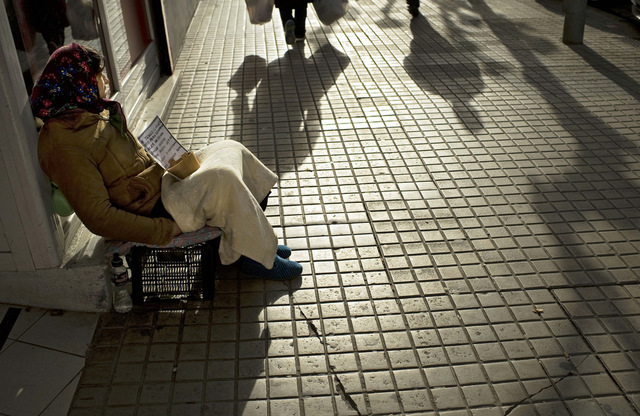The woman above is a beggar. The scene is Pamplona, Spain, but there is nothing that marks its location per se. In point of fact, within the last six months I’ve seen the almost identical scene in New Orleans, Chicago, St. Louis, and Indianapolis. And my guess is that others have seen it in many other cities and towns as well. Or maybe not. For while such scenes are all too present we have conditioned ourselves not to notice, to be blind to the situation. Indeed, we teach our children that it is impolite to stare at such people, and I fear that we learn our lessons all too well, choosing as adults not just to avoid staring but to take comfort in not seeing them at all. The problem that is created is a vexing one, as the photograph illustrates: The poor, the unemployed, the homeless are compelled to perform their abjection in public as a means of survival, but at the same time they must shroud themselves under the veil of a shadow, seeable but not noticeable, observable but not seen. It is hardly a situation conducive to encouraging public assistance, but then that doesn’t seem to be its purpose. Indeed, it seems to underscore a public-private dichotomy that forces (enables?) us to imagine (but never really see) the downtrodden as private individuals and not as members of a public, civic community.
What makes this photograph provocative is how it reminds us that we are all subject to the veil of the shadow. Notice how those passing by, whether walking to or fro, cast (or are cast in?) their own shadows. There is a difference, of course, as the shadows of those walking are dynamic, exuding a sense of agency, while those of the beggar are altogether static, belying any sense of intentional action whatsoever. In an important sense, however, the difference is minimal, no more really than a function of how the light casts its rays upon us—illuminating or hiding us by turns. And when we see the photograph in this context it is not difficult to imagine how quickly the roles played by the actors in the scene above can be reversed as casting a shadow morphs all too easily into being contained by one. In a sense, one might say, the photograph stands as a visual reminder of the cultural aphorism, “there but for the Grace of God …”
It is a humbling lesson, but one all the more important for it if we are to recognize and attend to the precarious and profound economic differences that seem to separate us.
Alvaro Barrientos/AP Photo

Independent contractor? Freelance fundraisers? Street entrepreneurs? I heard a lot of ironic terms for those who requested private donations in public spaces when I worked at a mental health center in Los Angeles a few years ago. They asked for food, bus tokens, money–and occasionally, beer–on the streets, but would never call themselves “beggars”. The term strips them of dignity, already compromised by their life situations. “Stop begging!” That’s what I would say to those who irritated me, were a bit too insistent, or too aggressive. Shameful of me. Note all the awkward terms I used above to try to avoid the word. I don’t have any romanticized fantasies those who ask for money from strangers on the street. But “beggar”? Even those in the most humiliating “work” (include mental health services) deserve at least a surface level of linguistic respect. This reminds me of our fruitless efforts to find a replacement for the word “homeless”. These attempts were just as awkward, convoluted, and dishonest as my substitutions for the word “beggar”.
Brenda: I agree completely. In fact I felt quite awkward using the word. I did so because that was actually how the image was captioned. But of course I should have put it in quotations marks. Thanks for reading closely!